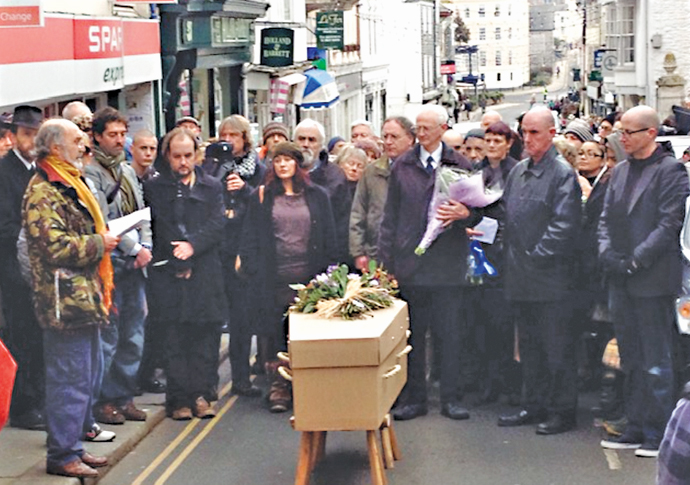‘The reimagining of how we serve the living by dealing with the dead’
Fiona Green on a ‘punk’ funeral director who is challenging the conventions on undertaking
Thursday, 29th September 2022 — By Fiona Green

Rupert Callender, far right, at the street funeral of a homeless man. Photo: Fiona Green
RUPERT Callender is an undertaker – a punk, acid-house version of one anyway, who holds the accolade of “the country’s best-known eco-friendly funeral director”. And his book What Remains? Life, Death and the Human Art of Undertaking takes us into a mysterious world filled with tension and unknowable scenarios. An adventure on a warm summer’s night leads us to a magical crop circle in a stranger’s field.
A ritual created alone in the dark: myth making; symbolic gestures used to ward off the power of death. It is within this mystery that we are introduced to the Rupert’s life as an undertaker.
I came across this modern-day shamanic version by wonderful happenstance when I witnessed him holding a ceremonial space in our town in winter. A young homeless man, Michael Gethin, had died of hypothermia on the streets of Totnes, Devon.
The mourners had met with the coffin, in the heart of the town and, after a brief introduction by Rupert, we all processed up the steep main street, each pair of coffin bearers taking it in turn, stopping briefly for a break about every 50 yards, as more and more onlookers joined in.
Halfway up the town, we stopped at a small park where Big Issue seller Graham Walker – top-hatted and tailed – made a heartfelt speech in honour of this fellow traveller he had known so well, before the procession continued to the top of town and the burial ground.
This unusual ceremony is a hallmark of Rupert’s approach, going with the wishes of the families and friends of the dead.
His book, he says, “is not an attack on the funeral industry per se, but it is an attack on the hijacking of our mortality by corporate bodies that only pay lip-service to the sorrowed and only engage with the void in order to conjure it up to channel our fear and grief into unnecessary purchases.”
He continues: “The arena I chose in which to live, or rather was chosen for me by life events, is the reimagining of how we serve the living by dealing with the dead.”
Three years later, I approached Rupert to help our family with the funeral of my ex husband, the poet and publisher Martin Green.
I was so moved by the care he took in collecting Martin’s body – out of county in Cornwall – allowing all of Martin’s children to spend the night before at his funeral home, decorating the coffin and, next day, all of us bearing it together in the crematorium, before his ashes were taken by us, to be with those of his International Brigade parents in Spain.
Having worked with the dead for more than 20 years, Rupert explodes old conventions, commenting on these with ruthless honesty that pervades this powerful book. Terms like “passed away” he says “are euphemisms of horror for young people” (my own mother-in-law was told as a small child that her mother’s “dear body had gone to heaven” and so for weeks she searched everywhere for her head).
Rupert elaborates throughout with heart-rending case accounts of some of the most profoundly moving moments of his life, as he goes about “brokering the reunion between the dead and the living… A grave and radical move, a quantum shift. Started with no apprenticeship but the power of idealism”.
“Life” he says, is inherently risky and no one is assured safe passage or a happy ending. “Once we showed ourselves to be willing to really accompany these families through this extreme darkness, we became the go-to undertakers for the most wounded families.”
What a huge contrast to the regularly dismal procession of cars most funerals have now, with a brief ceremony conducted by strangers, and no time for reflection – especially at a crematorium – and then sent off into a changed world with an expectation to just “get on with it”. “All,” he says, “for the sake of control, and money.”
This book is way ahead of its time. I cannot remember when I last read such a lively polemic that made me sit up and think.
Death has come uncomfortably close in the past two years with the Covid pandemic and global warming, which threatens our very existence as a race and Rupert’s beautiful book addresses so many questions we all have in the silent taboo land of death and dying, and he celebrates our capacity to face death with courage and compassion.
• Fiona Green is an artist and retired psychotherapist and former Fitzrovia resident who now lives in Devon.
• What Remains? Life, Death and the Human Art of Undertaking. By Rupert Callender. Chelsea Green, £20